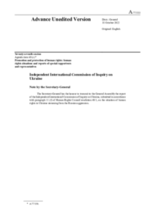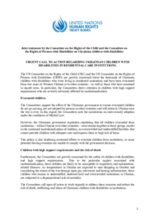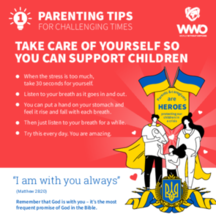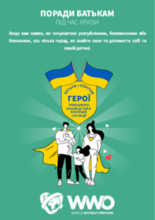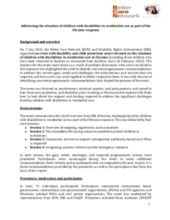This section includes resources, news and other key documents related to children's care in the context of the current humanitarian crisis affecting Ukraine and surrounding countries. This section is updated daily.
News
Featured Resources
Related Tools and Guidance
Country Care Snapshot
Events
Other Resources
Displaying 61 - 70 of 194
In this report, the Independent International Commission of Inquiry on Ukraine will refer to findings about events during late February and March 2022 in the four regions of Kyiv, Chernihiv, Kharkiv, and Sumy, as requested by Human Rights Council resolution S-34/1.
The "Children of War" platform was created on behalf of the Office of the President of Ukraine as a tool for finding children, rescuing them and liberating them from places of forced displacement or deportation.
Joint statement by the Committee on the Rights of the Child and the Committee on the Rights of Persons with Disabilities on Ukrainian children with disabilities. They express concern about the thousands of Ukrainian children with disabilities who were living in residential institutions and have been evacuated from war zones to Western Ukraine or to other countries, as well as those who have remained in unsafe areas. In particular, they draw attention to children with high support requirements who are negatively affected by institutionalization.
МЕТОЮ ЦЬОГО ДОКУМЕНТУ З РЕКОМЕНДАЦІЯМИ є надати певну рамку для підтримки фахівців-практиків і посадовців, відповідальних за вироблення політики у сфері опіки та піклування над дітьми, як в Україні, так і в країнах, які приймають біженців, у рамках заходів реагування, що стосуються опіки та догляду за дітьми в контексті України у відповідності до міжнародних стандартів і належної практики у сфері опіки та піклування та забезпечення альтернативних форм догляду.
This video and attached parenting tips offer simple and practical recommendations for Ukrainian parents on how to help themselves and their children to overcome various crisis situations.
У цьому відео ми пропонуємо прості і практичні рекомендації про те, як у цей непростий час допомагати собі та своїм дітям долати різні кризові ситуації.
Under the auspices of the Ukraine Children’s Care Group, one of two learning events were held in July and September 2022. This event, "Addressing the need for foster care in the context of the Ukraine crisis", was held on September 7th in collaboration with HDPI. It focused on better understanding the foster care systems and services in Ukraine and neighbouring countries hosting Ukrainian refugee children, specifically Poland, Romania, and Moldova.
On 7 July 2022, the Better Care Network (BCN) and Disability Rights International (DRI) organised an event with disability and child protection actors focused on the situation of children with disabilities in residential care in Ukraine (including those children who have been returned to families or evacuated from facilities since 24 February 2022).
The aim of this guidance document is to provide a framework to support child protection practitioners and policymakers working both inside Ukraine and in host countries to implement responses related to children’s care in the context of Ukraine in line with international standards and good practice on children’s care and the provision of alternative care.
Adopcja międzynarodowa nie powinna być realizowana w trakcie lub bezpośrednio po sytuacji kryzysowej. Pozostając w zgodzie z decyzją rządu Ukrainy o zawieszeniu adopcji międzynarodowych, wzywamy państwa przyjmujące, organy międzynarodowe i organizacje humanitarne do przyjęcia zharmonizowanego podejścia i wprowadzenia moratorium na przysposobienie międzynarodowe dzieci z Ukrainy. Zgodnie z powszechnie przyjętą zasadą dotyczącą obowiązków państw wynikających z prawa międzynarodowego, w sytuacjach kryzysowych, takich jak konflikt zbrojny, adopcja nie jest właściwym działaniem wobec dzieci pozbawionych opieki. Dzieci, które zostały rozdzielone z rodzicami w trakcie kryzysu humanitarnego, nie można uznać za osierocone. Do czasu ustalenia, co się stało z jego rodzicami lub innymi bliskimi krewnymi, każde dziecko rozdzielone z opiekunami należy traktować jako posiadające żyjących krewnych bądź opiekunów prawnych, a co za tym idzie – niepotrzebujące adopcji.

